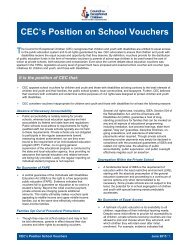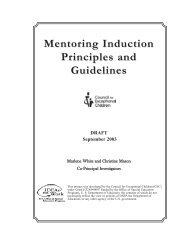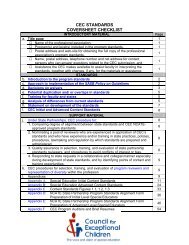What Every Must Know Special Educator - Council for Exceptional ...
What Every Must Know Special Educator - Council for Exceptional ...
What Every Must Know Special Educator - Council for Exceptional ...
Create successful ePaper yourself
Turn your PDF publications into a flip-book with our unique Google optimized e-Paper software.
Paragraph 2 - Government Responsibilities<br />
<strong>for</strong> <strong>Special</strong> Education in Intermediate<br />
and Local School Districts<br />
Intermediate and local school districts carry major<br />
responsibility <strong>for</strong> the quality of educational services to<br />
children and youth with exceptionalities and <strong>for</strong> leadership<br />
and coordination with other agencies to achieve<br />
comprehensive child centered services. Intermediate<br />
and local school districts should provide continuing<br />
leadership <strong>for</strong> all educational services in the community,<br />
including participation in the financing of every<br />
education program in the district and of any program<br />
outside the district which serves children and youth<br />
with exceptionalities at the district’s request.<br />
The <strong>Council</strong> believes that school districts should<br />
be responsible <strong>for</strong> an annual review of children and<br />
youth with exceptionalities who are legal residents of<br />
the district to assure that their education is proceeding<br />
adequately, even though they may be receiving<br />
their educational services outside their district of<br />
residence.<br />
Paragraph 3 - State or<br />
Provincial Governments<br />
The basic responsibility <strong>for</strong> guaranteeing an education<br />
to all children rests with state or provincial governments<br />
through their state or provincial education<br />
agencies; however, the fulfillment of this responsibility<br />
is effected in cooperation with federal and local<br />
education authorities. The <strong>Council</strong> believes that it is<br />
the responsibility of the state/province to guarantee<br />
each child comprehensive educational opportunities<br />
without cost to the child or the child’s family. <strong>Special</strong><br />
financial support should be offered to the intermediate<br />
and local districts or combinations of these units<br />
so that no excess local cost is involved in providing<br />
specialized quality programs, services, and facilities.<br />
While the cost of services <strong>for</strong> children and youth with<br />
exceptionalities varies greatly, such considerations<br />
should not affect the goal of optimal programming<br />
<strong>for</strong> every child. The <strong>Council</strong> believes that no financial<br />
incentive should be provided to encourage the adoption<br />
of a less than optimal education program. A particular<br />
responsibility of state/province governments<br />
is to provide progressive leadership and direction<br />
to coordinated state/provincial programs of special<br />
education and to provide coordination among the several<br />
departments of government other than education<br />
which may be called upon to serve children and youth<br />
with exceptionalities and their families.<br />
Paragraph 4 - Federal Governments<br />
of the United States and Canada<br />
The <strong>Council</strong> believes the federal government should<br />
give major attention to guaranteeing educational opportunities<br />
to children and youth whose education<br />
has been neglected. The federal government has a<br />
responsibility <strong>for</strong> assuring that the rights of children<br />
with exceptionalities are not violated. Because education<br />
of children and youth with exceptionalities has,<br />
in general, been a neglected area, special categories<br />
of support should be directed to meeting their needs.<br />
Federal financial aid should be directed to state or<br />
provincial governments <strong>for</strong> the education of children<br />
with exceptionalities.<br />
The federal government should provide <strong>for</strong> support<br />
of professional leadership in the field of special education<br />
with emphasis on assessment of needs, planning<br />
of needed programs, preparation of personnel, and<br />
research.<br />
The federal government should provide financial support<br />
to colleges, universities, and other appropriate<br />
agencies to assist in operating programs to prepare all<br />
needed personnel to conduct comprehensive special<br />
education programs and services.<br />
The federal government should provide financial<br />
support to school districts and combinations of school<br />
districts that wish to provide innovative or exemplary<br />
programs <strong>for</strong> children and youth with exceptionalities<br />
or that, <strong>for</strong> any reason, enroll an unusually high proportion<br />
of children and youth with special needs.<br />
The federal government should provide major support<br />
to programs in the field of special education that<br />
serve regional or national needs such as the education<br />
of migrant children.<br />
In instances where the federal government assumes<br />
primary responsibility <strong>for</strong> the education of a group<br />
of children (i.e., American Indian and Alaska Native<br />
children in Bureau of Indian Affairs operated and<br />
contracted schools and the education of dependents<br />
in Department of Defense schools and programs), it<br />
must also provide appropriate special education to<br />
these groups. As one means of accomplishing this<br />
goal, the Department of Interior, Bureau of Indian<br />
Affairs, should maintain a specific budget line item<br />
<strong>for</strong> special education and related services <strong>for</strong> children<br />
with exceptionalities.<br />
Appendix 9: CeC profeSSionAl poliCieS 247









